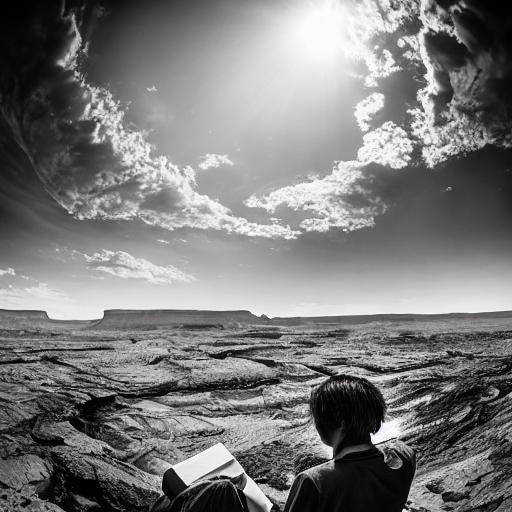(I started my reading journey From selfing in worlding to sovereignty. This is my finished up reader’s report.)
Iris Murdoch was a British novelist and philosopher who read Plato from a post-Wittgenstein lens, with a distrust of recent (post-)structuralist temple-smashing efforts. Though this is conflated with those I regard as straight structuralists like marxist revolutionaries, or freudians. Are builders and demolition teams the same thing? Because buildings?
What LLM models said about Iris Murdoch’s Good:
Iris Murdoch’s reading of Plato is contrasted to Platonists’ reading of Plato, who believe that the Good is an abstract form that exists beyond the physical world and can only be known intellectually. Murdoch believed that the Good is a concrete reality that is present in the world and can only be experienced through love and compassion, that is is practical and personal. She also argued that moral goodness should be a central concern for individuals, rather than a detached pursuit of ideal forms.
This is promoted in her last work, a re-working of her 1982 Gifford Lectures, which came out in 1992 as Metaphysics as a Guide to Morals (London: Chatto & Windus). While this is clear throughout, it is positively stated at the end. There is also in this moral philosophy a working of a literary seam in a Buddhist de-mythologised Christianity literature mine. Or put better, a methodology common to literature as they text-machine their positions, even when it is all really about something like love and compassion, practical and personal. A mine put somewhere else would come up with different treasures even when the method is the same. It is a way to world a way back to self I guess, this is the milk of human kindness after all.
I attach, as I have been arguing, great importance to the concept of a transcendent good as an idea (properly interpreted) essential to both morality and religion. How do you mean essential? There appears to be an internal relation between truth and goodness and knowledge. [Page 511 ]
Internal? I ask. Internal to them three — internal to us talky-talk — or internal to our living history?
Of course… —we world and self on regardless even if this is not the case essentially. Life goes on. But,
In my own case I am aware of the danger of inventing my own Plato and extracting a particular pattern from his many-patterned text to reassure myself that, as I see it, good really is good and real is really real. [page 510]
Anyway, to state my differences:
Report’s findings
The is little to no evolution in Iris Murdoch’s efforts, despite the calls promoting history against teh ‘structuralism (as deconstruction)’ (page 5- 6, & numerous).
So, remaining in the literature mine, despite being aware of Wittgenstein’s advice to throw the ladder away after building and using it, despite the Buddhist influence on her words, there is well, at least, I argue… —what is left and used thusly, is evidence itself that the moral urge works on us, and even when we are not worldbuilding intensely, but just reflecting, and wondering this way and that, it is still always there, not just in those moments when we throw stuff into the gap when someone points it out to us, and “someone” includes our own notice… —or when we valourise the narcissistic vandalistic joy of leaping into leaping into the leap into the void… —and calling it pious, or a duty, or whatever poor words we can find to hide our shame, our second face, at least we tried. But this is no trial.
I feel evolution helps us see that many things we see as eternal, timeless, absolute, necessary (under our worldbuilding urges) may well have a history, where, sadly, the evidence is only ‘taphonomically’ available in our lives: DNA, bodies and their remains. That what we regard as causes are actually outcomes: the good, the moral, the religious, the aesthetic… —these are outcomes of the same processes that fossilise, so these different aspects develop within different contexts and registers, and thus lose their history as far as we can see.
They are language games (even) when we don’t notice that they are language games. Where we reify them into reality as different objects, and pay people to do them, and so they must be explained within the game they are found, but the game is not their source. Our hardened usage… —blinds us.
It is not nothing all the way down, as much as it is not turtles all the way down. It is somewhere in between those two positions. Or, not even…
Iris Murdoch does admire agnosticism as a possible virtue, and I admire that, but at the end throws Good into the… —gap.
The “I want to believe.” moment.
In practical terms there is much I use personally here, but I find the framework wanting. Iris is aware of my position, at least in a premonitory form, but still throws stuff into the gap. I guess Iris throws stuff into the gap in a way that worlds better than most.
[My side thought is that perhaps the dialectic distracts us… —the idol of the dialectic blinds us to evolution’s ways, even as one eschews idolatry. We seek history but look in the wrong places.]
We world on regardless

Iris Murdoch theme list
From selfing in worlding to sovereignty : meika worlding Iris Murdoch's Wittgenstein
Iris Murdoch and the good of it : No/true!, it's not nothing all the way down either.
Newer version of this post at whyweshould.loofs-samorzewski.com.






page 167 "It seems to me that one cannot 'philosophise' adequately upon the subject unless one takes it as fundamental that consciousness is a form of moral activity: what we attend to, how we attend, whether we attend."